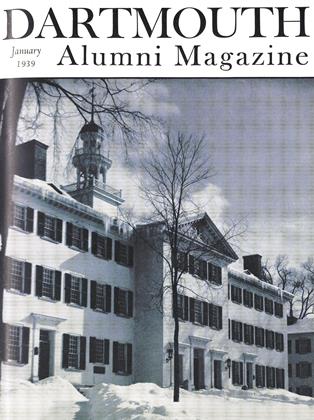An Answer to Relativ-ism, by Maurice Mandelbaum '29 (A.M.'32). New York, Liveright PublishingCorporation, 1938. pp. x, 340. $3.50.
This is a timely contribution. Charles Beard, Carl Becker and other American historians have recently denied that history can be written objectively; every historian is blinded by his own personal biases and prejudices, particularly social and economic, or, at best, by those of his own country and generation. A historian cannot describe an event as it has really happened. This doctrine of historical relativism, though comparatively new in this country, has for some time been advanced in Europe, especially in Germany, and attempts have there been made to refute it. Maurice Mandelbaum shortly after his graduation from Dartmouth, studied the literature of this movement while in Germany, and continued to consider the problem while a graduate student here and later at Yale, where he wrote his doctoral dissertation under Professor W. M. Urban, to whom this book is dedicated.
Professor Mandelbaum effectively exposes the inconsistencies in the relativistic positions of Croce, Dilthey and Mannheim, as well as the failures of idealists and phenomenologists like Simmel, Rickert, Scheler, Troeltsch and others to refute the historical relativists. He then advances his own refutation, from the standpoints of realism and the correspondence theory of knowledge. He explains the differences between relevance and causation as used in common sense, natural science, theoretical social science and history, and shows their mutual compatibility and validity. He establishes the possibility of genuine historical knowledge and confirms the dictum of Berkeley that "the same principles which, at first view, lead to skepticism, pursued to a certain point, bring men back to common sense."
 View Full Issue
View Full Issue
More From This Issue
-
 Class Notes
Class Notes1918*
January 1939 By ERNEST H. EARLEY -
 Article
ArticleStudying the Humanities
January 1939 By HENRY M. DARGAN -
 Class Notes
Class Notes1917*
January 1939 By EUGENE D. TOWLER -
 Article
ArticleMetropolitan Notes
January 1939 By Milburn McCarty Jr. '35 -
 Article
ArticleGradus Ad Parnassum
January 1939 By The Editor -
 Sports
SportsBig Green Teams
January 1939 By Whitey Fuller '37
William Kelley Wright
Books
-
 Books
BooksALUMNI PUBLICATIONS
January, 1925 -
 Books
BooksShelf Life
May/June 2001 -
 Books
BooksDAEMON IN THE ROCK.
June 1934 By Alexander Laing -
 Books
BooksJOURNEY OF A JOHNNY-COMELATELY.
November 1957 By HOWLAND H. SARGEANT '32 -
 Books
BooksFear of Flying, Combat in the Forecourt
October 1978 By ROBERT H. ROSS '38 -
 Books
BooksThe Early Adams
MARCH 1983 By Thornton F. Jordan '66





